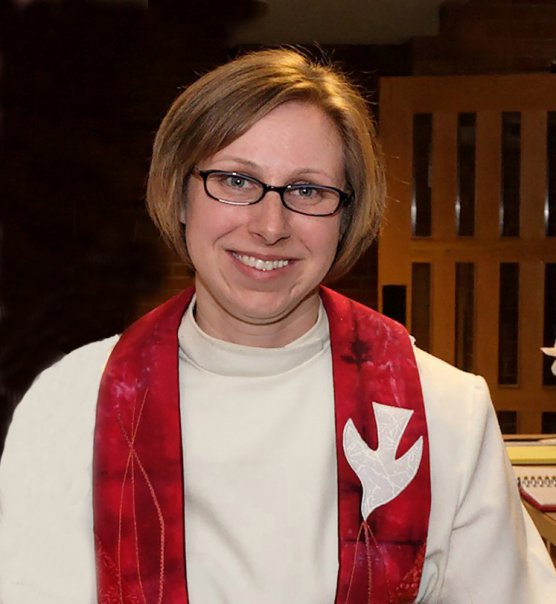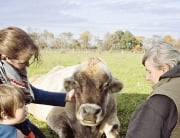Rev. Ruth Sorenson-Prokosch serves as the associate pastor at St. Timothy Lutheran Church in St. Paul, Minnesota. She took the time to speak with us about faith, stewardship, and why animal suffering should matter to followers of Jesus.
In the Book of Genesis, God instructs humanity to be stewards of animals. How would you describe what this means for Christians?
Like everything, there are differing interpretations of this scripture. My tradition (Evangelical Lutheran Church in America) has understood this verse (Genesis 1:26) to mean that God has given us the power to steward, tend, and care for creation. Stewardship and exploitation are very different things. We’re not called to “exploit” others. We’re called to be good stewards of the gifts that we’ve been given. It’s up to us to define what good stewardship looks like with the guidance of the Holy Spirit, our own reason, and our understanding of Scriptures.
Part of my spiritual practice is to pay attention to the choices I make so that I can reduce suffering when possible.
Why should animal suffering matter to Christians today?
Animal suffering, like all suffering, should matter to us because it matters to God. Through Christ, God is revealed as compassionate, forgiving, merciful, and full of grace. Jesus calls us to care for “the least among us,” those who are vulnerable or suffering, so that’s what we are called to pay attention to: issues of suffering. Our life of faith isn’t something that we live out of only on Sunday mornings—it’s how we live our daily lives that reflects our faith. When I became aware of what factory farming does to animals, the environment, and those who work in that industry, I had to make a choice: ignore what I’ve learned and look the other way or make a different choice. Giving up meat was much easier than knowing that my choices would cause such harm.Part of my spiritual practice is to pay attention to the choices I make so that I can reduce suffering when possible. I’m not perfect, nor will I ever be, but I can be intentional. This is true for all areas of our lives. What we eat; how we treat our family, neighbors, and coworkers; how we care for creation; and how we work on behalf of those on the margins—it all matters because we’re all part of God’s beloved creation.
Tell us about your church’s annual “Blessing of the Animals” event and why it’s important to your congregation.
A few years ago, a woman in my congregation asked if we could have a Blessing of the Animals service. I was so excited for this to become a tradition! We’ve included this worship experience every year near the Feast of St. Francis of Assisi. When we bless something, we’re saying that it has value in our lives and we give thanks to God. Animals are a huge part of some people’s lives—they’re members of the family. Bringing those “family members” to church gives us the opportunity to thank God for them in a more formal way, as formal as a bunch of animals can be in the backyard of a church! Our Blessing of the Animals is pretty low key. We hear Scriptures, share what our animal companions teach us about God, confess the ways that we’ve not honored or cared for them, and hear words of forgiveness. We pray for all of God’s creatures, and then, each animal gets blessed. We collect an offering for our local humane society and have time for the people and animals to mingle. Our animal companions bring out a different side of ourselves, and it’s so much fun to meet and bless this part of peoples’ lives.
What would you say to a Christian who believes that helping animals is a cause for the secular world?
This is an issue for all of us. Being a follower of Jesus opens us to the messiness of life. We like to think of Jesus as this safe guy who wants us to be nice. That’s not what Jesus was about. Jesus pointed out injustice, ate with sinners, forgave what seemed unforgivable, and touched lepers. Jesus showed compassion to those who were hurting, healed the sick, and paid attention to the outcasts, and he asks us to do the same. Whether it’s advocating for the oppressed, feeding the hungry, welcoming the stranger, or caring for the Earth and animals, issues of compassion are issues of faith. No compassionate person would condone dogfighting, animal hoarding, or puppy mills, but when it comes to facing what happens to the animals we eat, we make the choice not to know so we can eat meat without guilt. A lot of people say to me, “My grandparents farmed, and the animals were well cared for, so meat isn’t bad.” I give thanks for those farmers who respected and cared for their animals, but the meat you buy at the grocery store didn’t come from the image in our heads of happy cows living a lovely life in a pasture. When we educate ourselves, we risk finding out something we didn’t want to know, of course, but it also gives us the opportunity to live a more compassionate life that’s in line with what we value.
Who is your favorite animal theologian?
Saint Francis of Assisi, because of his writing of “The Canticle of the Creatures.” He speaks of “Brother Sun” and “Sister Moon,” “Brothers Wind and Air” and “Sister Mother Earth.” These images, which tie all of us and creation together as sisters and brothers, beautifully communicate our interconnectedness and our interdependence. While not a specific theologian, our Scriptures give us images of God caring for us as a shepherd cares for his flock. Psalm 23 is probably the most famous, but Isaiah 40:11 says, “He will feed his flock like a shepherd, he will gather the lambs in his arm, and carry them in his bosom, and will gently lead those that have their young.” These are lovely images of not only how humans and animals can interact but also how God interacts with us. God does not desire relationships where one is exploited for the wants of another. God does not make us or animals a commodity—we’re both part of God’s creation and are cared for as such.
*****
Like this? Read more testimonials.







